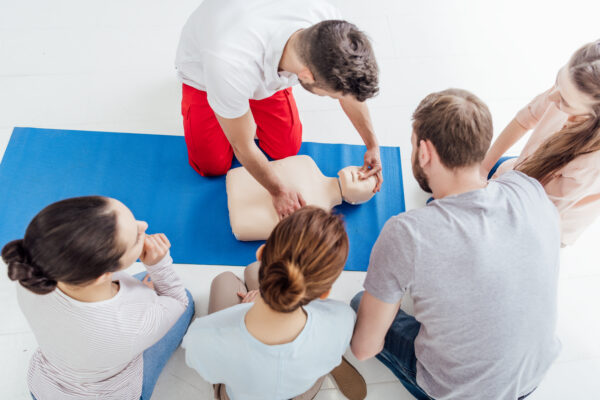Introduction
In today's busy work environment, making certain the safety and health of employees is critical. Amongst the important elements of work environment safety is the provision of Automated External Defibrillators (AEDs). These lifesaving gadgets are important for replying to sudden heart attacks, which can happen in any setup, consisting of offices. This thorough overview will certainly look into the Workplace AED Demands in Australia, highlighting what every employer needs to find out about implementing and keeping AEDs.
Workplace AED Needs in Australia: What Every Employer Demands to Know
Understanding the legal and functional demands bordering AEDs hltaid012 online training is essential for all companies in Australia. The Australian Resuscitation Council highlights that having an AED on-site can substantially enhance survival prices throughout heart emergency situations. Companies must acquaint themselves with their responsibilities under appropriate regulation, including the Job Health and wellness Act 2011.
The Relevance of Having an AED in Your Workplace
Every second matters when it involves a heart emergency. An AED can be the difference in between life and death. According to studies, very early defibrillation enhances first aid hltaid012 survival prices by approximately 70%. This emphasizes why it's not simply a good idea-- it's a necessity.
Understanding Automated External Defibrillator Explained Australia
An Automated External Defibrillator (AED) is a mobile tool that checks heart rhythm and can send out an electrical shock to the heart if necessary. The device guides customers via the procedure with voice prompts and aesthetic guidelines, making it useful also for people without any clinical training.
How to Use an AED Detailed Australia
Using an AED involves several crucial actions:
Assess Responsiveness: Check if the individual is responsive. Call for Help: Dial emergency situation services immediately. Retrieve the AED: Get the closest AED. Attach Pads: Comply with diagrams on pads for correct placement. Analyze Heart Rhythm: The device will certainly analyze whether a shock is needed. Deliver Shock if Necessary: Guarantee no person is touching the individual before pressing the shock button. Continue CPR: After providing a shock, continue mouth-to-mouth resuscitation till emergency situation services arrive.AED and mouth-to-mouth resuscitation With each other Australia
Combining mouth-to-mouth resuscitation with an AED improves survival chances significantly. While waiting for a rescue, executing mouth-to-mouth resuscitation keeps blood flowing, raising oxygen supply to important body organs up until defibrillation can occur.
AED Usage on Kid Australia
When utilizing an AED on kids, unique pediatric pads are usually required. Many modern-day devices come equipped with child-specific setups that change power degrees based upon age or weight criteria.
AED Battery Upkeep Australia
Maintaining your AED consists of examining battery condition frequently, changing batteries according to manufacturer standards, and making sure pads are not expired or damaged.

Workplace AED Demands Australia
Employers have to make certain that:
- A suitable number of AEDs are available based on office dimension and location. Employees have accessibility to training for using the device. Regular maintenance checks are performed according to maker recommendations.
Public AED Locations Australia
Many public areas currently feature obtainable AEDs; recognizing where these places are can conserve lives beyond office setups too. Local councils usually keep data sources of these locations.

Defibrillator Training Programs Australia
Training training courses provide crucial knowledge about using defibrillators efficiently along with mouth-to-mouth resuscitation methods. Organizations like St John Rescue deal qualifications that outfit staff members with lifesaving skills.
Defibrillator Regulation Australia
Legislation bordering defibrillators differs by state however typically mandates certain work environments, such as health clubs or aged treatment centers, to have AEDs readily offered for usage during emergencies.
Choosing Right AED Australia
Selecting an ideal model depends upon aspects such as:
- Intended usage (workplace vs commercial) User-friendliness Availability of pediatric options
Identifying Possible Disasters in Your Workplace
Employers should carry out risk assessments frequently to recognize possible clinical emergency situations one-of-a-kind to their environment-- this may consist childcare first aid course blended of examining staff member wellness risks or ecological dangers influencing emergency situation response protocols.
FAQs
1. What is an Automated External Defibrillator?
An Automated External Defibrillator (AED) is a mobile device made to treat people experiencing sudden heart attack by providing an electric shock that assists restore regular heart rhythm.
2. Are there lawful demands for having an AED in my workplace?
Yes, while details regulations might differ by state or region, numerous regions call for work environments-- particularly those considered high-risk-- to have actually accessibility to automated outside defibrillators as part of their first aid provisions.
3. Just how often should I examine my work environment's AED?
It's advisable to inspect your workplace's AED at the very least as soon as a month and after each use, guaranteeing that batteries are useful and pads are within expiry dates.
4. Can any individual make use of an AED?
Yes! Modern gadgets are created for laypeople and provide detailed audio instructions; nevertheless, formal training is suggested for optimal readiness throughout emergencies.
5. What is included in defibrillator training courses?
Courses generally cover just how to operate an AED safely, carry out mouth-to-mouth resuscitation effectively, identify indicators of cardiac arrest, and respond properly during clinical emergencies.
6. Where can I discover public access defibrillators?
Public accessibility defibrillators can be found in various places such as shopping centers, airports, institutions, showing off venues, and community centers; local authorities frequently keep maps revealing these locations.
Conclusion
Ensuring workplace safety and security involves greater than just compliance; it has to do with cultivating a culture of readiness amongst staff members concerning health and wellness emergencies such as cardiac arrests. Applying effective plans around Automated External Defibrillators (AEDs) not just boosts your task of treatment but likewise shows dedication toward worker well-being-- a win-win situation!
In recap, understanding the necessary elements bordering workplace AED needs in Australia outfits companies with knowledge necessary for producing safer atmospheres conducive to both productivity and wellness among team member-- because at the end of the day? Everybody deserves satisfaction understanding they're taken care of!
